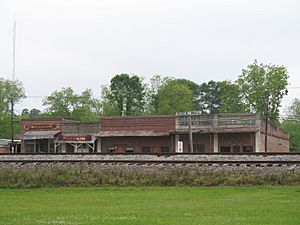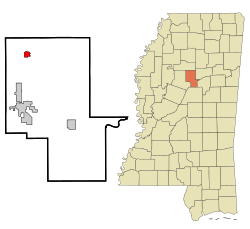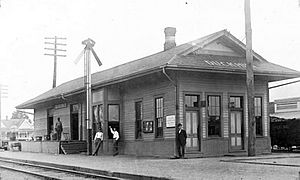Duck Hill, Mississippi facts for kids
Quick facts for kids
Duck Hill, Mississippi
|
|
|---|---|

Duck Hill from across the tracks
|
|
| Motto(s):
The place called home
|
|

Duck Hill, Mississippi is highlighted in the small red zone.
|
|
| Country | United States |
| State | Mississippi |
| County | Montgomery |
| Government | |
| • Type | Mayor-Counsel |
| Area | |
| • Total | 1.03 sq mi (2.68 km2) |
| • Land | 1.03 sq mi (2.68 km2) |
| • Water | 0.00 sq mi (0.00 km2) |
| Elevation | 253 ft (77 m) |
| Population
(2020)
|
|
| • Total | 619 |
| Time zone | UTC-6 (Central (CST)) |
| • Summer (DST) | UTC-5 (CDT) |
| ZIP code |
38925
|
| Area code(s) | 662 |
| FIPS code | 28-20260 |
| GNIS feature ID | 0669470 |
Duck Hill is a small town in Montgomery County, Mississippi, USA. In 2020, about 619 people lived there.
It's found on U.S. Route 51, right between the towns of Grenada and Winona. A stream called Big Bogue Creek runs east of the town. Every July, Duck Hill hosts the Lucie E. Campbell Gospel and Heritage Festival. It's a fun event for everyone!
Contents
Discovering Duck Hill's Past
Duck Hill gets its name from a large hill northeast of town. A Choctaw chief named "Duck" used to hold important meetings there. Chief Duck was also a medicine man who helped his people. Today, you can see a statue of Chief Duck on U.S. Route 51, next to an old Illinois Central Railroad train car.
The first European-American settler in this area was John A. Binford in 1834. He built the first home and started a large cotton farm. He became a very successful farmer, using enslaved people to work his land. Binford was later elected to the Mississippi Legislature. Duck Hill became a busy trading spot for cotton farmers.
During the American Civil War, Binford's sons, James R. and John A. Jr., led a group of soldiers from Duck Hill called the "McClung Rifles." After the war, James R. Binford became a state senator. He wrote laws that kept Black and white people separate and unequal in Mississippi. These laws were known as Jim Crow laws.
In 1856, the Illinois Central Railroad built a train line through Duck Hill. This helped local businesses grow. Famous passenger trains, like the City of New Orleans and the Panama Limited, once passed through the town. Today, the line is used by the Grenada Railway for moving goods.
A serious train accident happened in Duck Hill on October 19, 1862. Two trains crashed head-on early in the morning, killing 34 men. Most of them were Confederate soldiers. It was the worst train accident in the South at that time.
In 1887, business people thought Duck Hill would become a busy factory town. This was because iron ore was found nearby. The New York Times described Duck Hill as "a straggling wee bit of a hamlet."
Duck Hill was also the scene of a train robbery in 1888. Two armed men, Rube Burrow and Joe Jackson, jumped onto a train as it left the station. They forced the engineer to stop the train about a mile north of town. The robbers stole $3,000 from the train's safe and killed one man who tried to help.
Duck Hill in the 20th Century
In 1930, the Lloyd T. Binford High School opened in Duck Hill. It was named after Lloyd T. Binford, who was a film censor in Memphis. The town also built a special building for students learning about farming. A new elementary school was built in 1963. These schools have since closed because fewer people live in Duck Hill now. The old high school gym is now used as a community center. Volunteers are working to protect the old high school building.
During World War II, many African American soldiers were trained in the South. In 1943, some armed Black soldiers from a nearby camp came to Duck Hill at night. They fired shots into the town, but no one was hurt. The soldiers were upset about a recent attack on other Black soldiers in Starkville, Mississippi.
Senator Trent Lott grew up in Duck Hill in the 1940s. He once said that his teachers in Duck Hill were some of the best he ever had.
Duck Hill's Location
According to the United States Census Bureau, Duck Hill covers about 1.0 square mile (2.6 square kilometers) of land. There is no water area within the town limits.
People of Duck Hill
| Historical population | |||
|---|---|---|---|
| Census | Pop. | %± | |
| 1880 | 151 | — | |
| 1890 | 332 | 119.9% | |
| 1900 | 242 | −27.1% | |
| 1910 | 499 | 106.2% | |
| 1920 | 528 | 5.8% | |
| 1930 | 553 | 4.7% | |
| 1940 | 537 | −2.9% | |
| 1950 | 537 | 0.0% | |
| 1960 | 674 | 25.5% | |
| 1970 | 809 | 20.0% | |
| 1980 | 706 | −12.7% | |
| 1990 | 586 | −17.0% | |
| 2000 | 746 | 27.3% | |
| 2010 | 732 | −1.9% | |
| 2020 | 619 | −15.4% | |
| U.S. Decennial Census 2010 2020 |
|||
Population in 2020
| Race / Ethnicity | Pop 2010 | Pop 2020 | % 2010 | % 2020 |
|---|---|---|---|---|
| White alone (NH) | 222 | 169 | 30.33% | 27.30% |
| Black or African American alone (NH) | 493 | 439 | 67.35% | 70.92% |
| Native American or Alaska Native alone (NH) | 3 | 2 | 0.41% | 0.32% |
| Asian alone (NH) | 0 | 0 | 0.00% | 0.00% |
| Pacific Islander alone (NH) | 0 | 0 | 0.00% | 0.00% |
| Some Other Race alone (NH) | 0 | 0 | 0.00% | 0.00% |
| Mixed Race/Multi-Racial (NH) | 9 | 8 | 1.23% | 1.29% |
| Hispanic or Latino (any race) | 5 | 1 | 0.68% | 0.16% |
| Total | 732 | 619 | 100.00% | 100.00% |
Note: The US Census counts Hispanic/Latino people as an ethnic group. This table separates them from the main racial groups.
Local Businesses
Duck Hill has a few small businesses. These include a Jiffy Mart gas station where U.S. Route 51 and Main Street meet. There is also a Regions Bank. In 2009, a Dollar General store opened in the northern part of town, near U.S. Route 51.
Schools and Education
The Winona-Montgomery Consolidated School District serves Duck Hill. Its schools are located in Winona.
Duck Hill used to have its own schools, including Duck Hill Elementary School and Duck Hill High School. The elementary school had about 100 students around 2001. The Duck Hill Head Start Center is a preschool located at 620 Carrollton Street. In 2018, the Montgomery County School District and the Winona Separate School District joined together to form the Winona-Montgomery district.
Famous People from Duck Hill
- Lloyd Binford - An insurance executive and film censor for many years.
- Roxcy Bolton - A well-known activist for women's rights.
- Lucie Campbell - A talented composer of hymns (religious songs).
See also
 In Spanish: Duck Hill para niños
In Spanish: Duck Hill para niños
 | Victor J. Glover |
 | Yvonne Cagle |
 | Jeanette Epps |
 | Bernard A. Harris Jr. |



